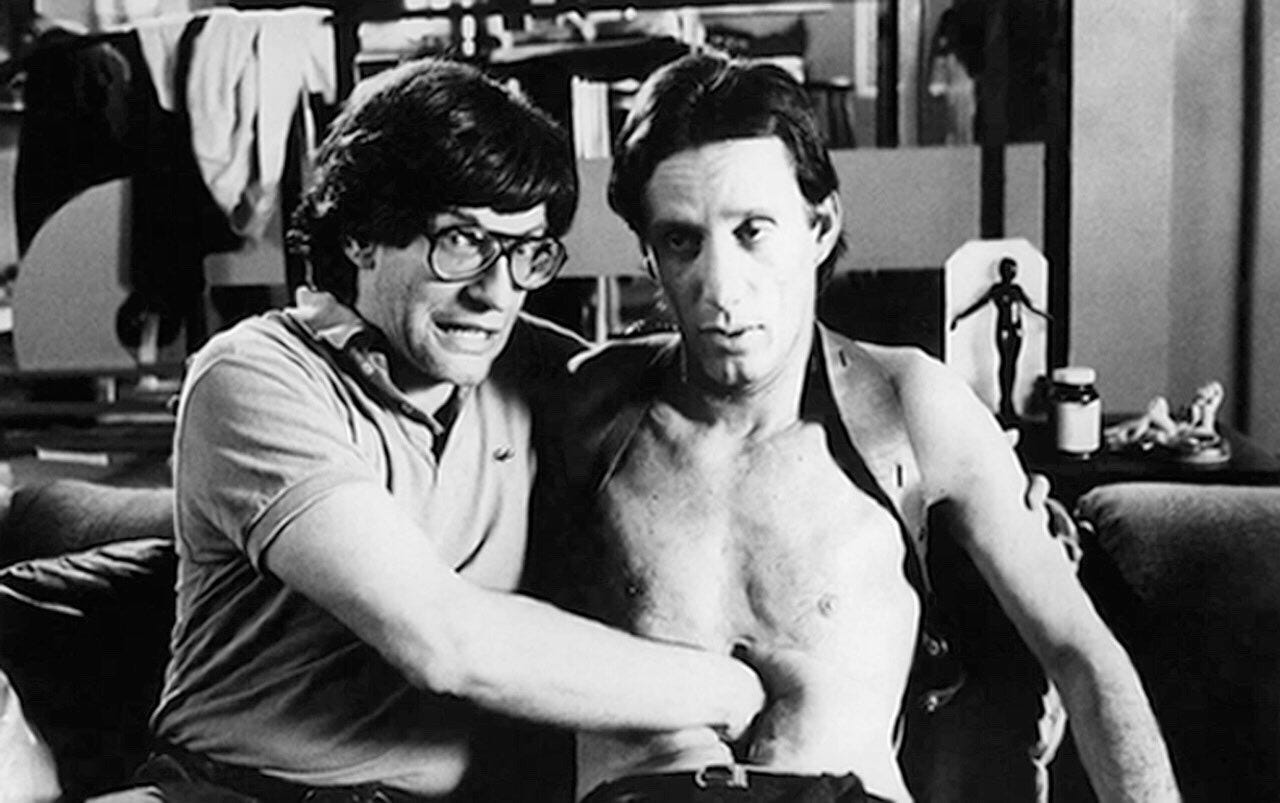David Cronenberg, Part 2
On body horror
Some of us have never passed as straight or cis. Some of us always do until we choose to disclose. (And then, of course, there is erasure, which is when we’re told that we’re not what we say we are, or that what we say we are doesn’t even exist.)
Most of us queer and trans people, I think, exist somewhere in the middle, when it comes to gender and sexuality, anyway. Regardless, for those who are not a member of an oppressing class, any level of passing—whether it has to do with your gender or sexuality, or other attributes, like race, ethnicity, class, ability, or other aspect of your identity—is conditional. Sometimes the consequences of failing to pass after having passed on first glance are even more brutal upon disclosure, since one is understood to have been willfully deceptive.
As a white queer person, I should make it clear that passing as straight or cis doesn’t map 1:1 to any other kind of passing, particularly with regards to race (I dithered over whether to use “straight” rather than “straight and cis” in this entry, as I’m not entirely sure that they can be separated in this context. See, this shit is complicated enough with only one [or is it two?] axis of identity/oppression!). There’s plenty of actual scholarship about the similarities, differences, and relationships between concepts of passing, about which I’m not even an amateur, but I will say that I was reminded of how all the ways of passing are inextricably linked together when I revisited Harlem Renaissance-era novels about passing last year: I can speak to my experience with passing as a transsexual, but it’s impossible to do so in a vacuum.
Passing (1929) and Plum Bun: A Novel Without a Moral (1928) are, among other things, studies of the psychological effects of passing on the person who passes that “both stabilize and reinforce” not only the construction of racial and ethnic identity, but of class, gender, sexual morality, and self-identity. As the protagonists, both young, upwardly mobile, Black American women, discover, passing as white can provide many social and material benefits, but it’s also necessarily isolating from their families and communities of origin, and from other Black people more broadly. While they undertake passing in order to capitalize on the aforementioned social and material benefits of whiteness, neither has total control of others’ perception of them; passing full-time takes practical and emotional work, and must be upheld and maintained while under constant threat of exposure. No attempt to pass is undertaken without risk, and between the market and the state and the state-sanctioned nuclear family, it’s impossible to control the intersectional variables determining their ability to pass: family, friends, lovers, religion, upbringing, affect, history, mannerism, clothing, money, social class, career, health, desirability, desires, life experiences.
Marginalization is like a crystal: The more facets you have, the brighter you become. The more ways in which you’re marginalized, the more obvious you are. You pass less, pass less thoroughly. You are less legible, more difficult to understand. As someone who was, for a short, dubious time, a straight white woman with white parents and a white family, I can’t remember my race ever being questioned, much less being a topic of conversation. When I failed to transition at 23 before going back into the genderqueer closet, my race remained a non-issue.
Then I started doing sex work, entering a business in which it is normal to explicitly market yourself based on your gender, race, and other aspects of your body and identity (yes, I once had sexy feet). The combination of the environment and my ambiguous gender—which caused many prospective clients, and even some of my regulars, anxiety about what it meant for them and their desires—suddenly made me a person whose whiteness was, occasionally, in question.
Not only were some of my clients concerned that being attracted to me complicated their heterosexuality, but some were invested in the “truth” about my racial and ethnic background. At first, I thought it was my makeup or the dim lightning that made white clients sometimes ask, once we were alone, if I was Jewish or Greek, once even Egyptian. I had to learn more about the machinations of white supremacy from the workers of color around me to understand that in highly sexualized, raced, and gendered environments, like the space of a sexual financial transaction, we’re all under more scrutiny, and any deviation from the norm just comes out louder; that, furthermore, these questions were as much my clients’ projections—fantasies—as they were symptomatic of my environmental incoherence.
Because being sexualized first as a woman, then as a prostitute, and then as gender non-conforming/of ambiguous gender, despite my whiteness, made me less coherent and therefore less human to my clients—and as we know, it’s more acceptable to interrogate less-human people about their lineage, where they’re “really from,” what’s in their pants, why they’re using a cane, etc. (My non-white clients never questioned my whiteness, although it was very important to many of them, and one of the main reasons why some of them came to see me at all.)
It’s indicative of my experience as a white gentile of Northern European descent that these questions never offended or bothered me. At the time, they struck me as weird, a little amusing. I had never been given a reason to be afraid of another person’s assessment of my race, and there was no underlying aspect of my identity that, once “discovered” or “proven,” could pose a real threat to my whiteness and the privilege it affords. I may have been occasionally asked to confirm my racial identity, but I was never at risk of not passing as white—of not being white.
I can’t say whether or how much the trauma of forced puberty would affect someone in a world without structural transphobia (and the colonialism and white supremacy from which it stems), but if there’s a silver lining to the absolute nightmare of gender dysphoria, it’s the Tiresian perspective of watching your social status shift—to be honest, plummet—in real time when you begin to transition. The headfuck is confusing and devastating and also, somehow, worth it.
You will need time to adjust. It’s taken me ages to be able to see my life as it is in contrast with the life I may have expected to have as a straight white woman, a gay white woman, or a gay white gender-conforming person, as well as a lot of work on the part of people of color—friends, lovers, organizers, academics, artists—for me to understand that this disparity in privilege doesn’t mean I’m not still white.
But back to the crystal of marginalization. Maybe it’s also a microscope (metaphors, baby!). Over time, you learn to look up instead of inward, to peer back through the lens and into the eye of the beholder. Like any single-celled organism worth its salt, you can learn how to live under a microscope, but I don’t know that you ever get used to it.
A little something about your humble David: I don’t allow people to take pictures of me and avoid appearing in them, other than a selfie here and there—a medium over which I have total control, but which more often than not depresses me anyway—because seeing myself as I am is just not good for me. This can be irritating for people in my personal life (parties, dates, weddings, quarantine outings), and inconvenient for people in my professional life, and a hindrance to being an artist in a digital world; photoshoots and self-promotion was, without a doubt, the hardest part of sex work’s business end. But I still can’t bring myself to do it. It’s not just that I hate how I look. It’s that how I look reminds me of being a teenager, aware of others’ eyes on me as my body slurred into monstrosity during the vicious (yes, I’m going to do it, I’m going to use the “g” word) gaslighting of forced puberty. This is normal and okay and good. You are a girl on your way to becoming a straight woman. That is what you are, and what you were born to be. Living as the wrong gender is a non-stop horror movie, and a lot of us live inside it for years, if not our whole lives. Though I’ve written about it extensively, including in my first book, it’s an experience I simply cannot find adequate words for, and for which I have given up trying to create a corollary in order to explain it to cis people. If cis people could understand, they would be trans.
I’m not the first to point out that many trans people find a home in the body horror genre. I follow many trans artists and writers who create, engage with, and critique body horror. Just off the top of my head: Willow, Caden, Willow and Caden, Gretchen, Sasha, Andrea, and Chris. Many have noted that the figures of this subgenre often speak to the monstrosity of the queer and trans experience: otherworldly sadists, alien body-snatchers, evil surgeons.
One of the undisputed, and much-beloved, masters of body horror is David Cronenberg. For me, as for many of us, his movies not only depict embodied experiences that recall our own, but awaken latent sensibilities, becoming devices for exploring and thinking about the long-term predicament bondage of stifled transsexuality.
I was 20 or 21—a pre-pervert David—when I saw Videodrome (1983) in my friend Kevin’s living room, rapt and speechless at slack-jawed Debbie Harry’s sensual pincushioning; at James Woods’ obsessive pursuit of a secret TV channel devoted to sadomasochism and torture. I was aware that the normal reaction to this movie ought to have been one of horror, but I couldn’t muster it. What I really wanted was to be like Harry: to have someone to put needles in me and then fuck me. I was captivated by Woods, and by the chest vulva that Caden calls blatantly transsexual, but I was positively entranced by Harry’s desire for self-destruction. It took me 15 years of self-harm to come to terms with my desire to go on hormones; it occurs to me that destruction was much more accessible to me, at 20 or 21, than the FTM nightmare that Woods acts out. Plus, Harry is just incandescent—pure punk sex.
I was well into the lifestyle by the time I saw Crash (1996), but was equally enthralled. Crash is a very good movie about people who get off on car accidents, and is not to be confused with Crash (2004), a very bad movie about white guilt. Cronenberg’s Crash is on my short list of Most Romantic Movies Ever; even more than Secretary (2002), which I loved and which also stars James Spader but which is also, arguably, a twee attempt at rehabilitating kink, Crash is true SM romance. It doesn’t fear the fuck, pain, death, change, disability, or insanity. It doesn’t fear fear. Here is suffering, it says. Where’s the lube? In a recent interview, Cronenberg insisted that “Movies were made for sex, there’s no question about it.” Crash is living proof.
I’ve always wondered about Cronenberg’s ability to telegraph something that people like him have, in my experience, almost always been unable to understand. How is it that this straight, white, cis man “unintentionally made a half dozen or so films that could easily be placed alongside words like ‘body dysphoria’”? You can’t swing a dead cat without hitting powerful straight white men in Hollywood (and elsewhere), but Cronenberg’s particular perspective still resonates.
Perhaps it’s because, as trans people, we feel so uniquely attached, so unable to divest from or be impartial to the horror of the human body. And it’s not just our relationship to horror, but cis people’s, too: Our bodies are often stand-ins for the monstrosities at horror cinema’s core—how could we possibly be neutral? Writing about Netty Rodriguez Arauz’s review of Hellraiser, cis writer Matthew Rogerson notes, “Recognizing that an experience can be both horrific and liberating allows us to explore many marginalized ways of being through the experience of the ‘other’ in horror, but in body horror there may be a queer experience that does more than just co-opt, more than just equate queer with monster.” Perhaps Cronenberg can speak for us in a way that we cannot because, as a cis person, he doesn’t have skin in the game.
But this thesis doesn’t hold water—I mean, Cronenberg may not be trans, but the man has a human body, just like everyone else, one that is fallible to age, injury, disease, and someday to death. Maybe it helps to revise my question: I won’t ask why a cis person tapped into a trans sensibility so well, but how.
In his introduction for a new translation of Franz Kafka’s The Metamorphosis, the inspiration for the short story that The Fly (1986)—considered by many, including Willow and Caden, to be his greatest film—was based on, Cronenberg identifies the history of “magical transformations” within humanity’s narrative canon:
They articulate that universal sense of empathy for all life forms that we feel; they express that desire for transcendence that every religion also expresses; they prompt us to wonder if transformation into another living creature would be a proof of the possibility of reincarnation and some sort of afterlife and is thus, however hideous or disastrous the narrative, a religious and hopeful concept.
Empathy, like marginalization, is a compounding formula. Those who lack empathy for transsexuals are not known for their otherwise unlimited generosity (what’s that saying? Scratch a TERF and find a racist?). Failing to see the humanity of an othered person is not only cruel, but indicates a lack of imagination, curiosity, and even hope.
Imagination, curiosity, and hope demand ugliness, fear, and pain, all components of reality. Cronenberg writes that he has The Fly’s hero, Seth Brundle, say during his transformation, “I’m an insect who dreamt he was a man and loved it. But now the dream is over, and the insect is awake.”
[Seth] is warning his former lover that he is now a danger to her, a creature with no compassion and no empathy. He has shed his humanity like the shell of a cicada nymph, and what has emerged is no longer human. He is also suggesting that to be a human, a self-aware consciousness, is a dream that cannot last, an illusion.
Willow says that, as trans people, we are our own ghosts, but the demarcation between our past and future selves is never as simple as before/after pics, never as clear-cut as alive and dead. It gives me no pleasure to be reminded of Maggie Nelson’s appropriation of Jason’s Argo as a metaphor for transition as I undergo it myself (if we’re going to be giving cis creators license to explore trans narratives, why would it go to Maggie Nelson over David Cronenberg, whose sensibility actually appeals to us and who hasn’t made hay out of being a weirdo chaser?). I’ve watched myself and watched others watch me go through these social and medical changes, trying to measure my progress, trying to pinpoint exactly when someone else decided I was no longer as human as they were, human being, in this case, not a binary but a matter of degree.
When asked if he thinks about his body, Cronenberg replied: “All the time…I am constantly body-conscious, that’s the thing you photograph most as a film-maker, human figures. It’s just that that consciousness sits well with me.”
David tweets at @k8bushofficial.
Subscribe to support our mutual aid project, GOOD ADVICE/BAD GAY, a bimonthly advice series from an anonymous gay therapist who’s not afraid to hurt your feelings with the truth. Sample an unlocked post for a taste of what you’re missing.





Ah, Cronenberg, one of the great Davids. This makes so much sense to me.
THIS ONE IS SO SO SO GOOD